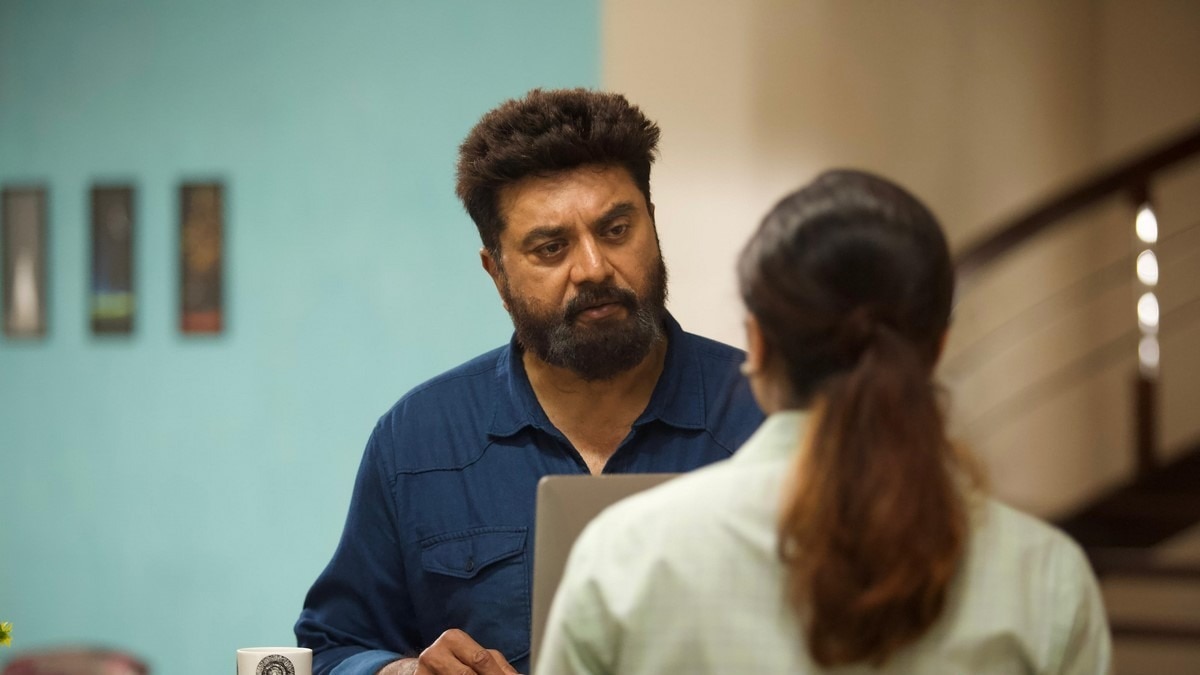Movie Reviews
Movie Review: In ‘Blue Jean,’ a nuanced picture of life as a lesbian in Margaret Thatcher’s Britain

A high school gym teacher grappling with her sexual identity is challenged on both a micro and macro level in 1988 England in “ Blue Jean,” a quietly complex portrait of compartmentalization and self-actualization.
In October 1987, British Prime Minister Margaret Thatcher gave a speech in which she bemoaned the state of education and said that “Children who need to be taught to respect traditional moral values are being taught that they have an inalienable right to be gay.” This was just part of her critique of the state of education and the agenda of “extremist teachers” pushing “political slogans” and “anti-racist mathematics” who are cheating children out of a “sound start in life.” By May of 1988, a law was passed (Section 28) that would “prohibit the promotion of homosexuality” and would remain in effect in some form until 2003. Don’t worry if the law doesn’t sound familiar either – it was news to both the film’s director and star.
The film, which opens in limited release Friday, is the assured directorial debut of Georgia Oakley, who focuses her script not on the women who went out to protest as the House of Lords debated Section 28, but on one who was still coming to terms with her own identity. Jean (Rosy McEwen) is not terribly political, and, like most teachers, keeps her private life to herself. But she’s also one whose livelihood and passion (teaching) would be directly threatened by the law. Her journey in the film is a human one – there are mistakes, deep regrets, and casualties – and it’s her flaws that make her relatable. She is not, in other words, exactly an inspirational hero.
At the beginning, Jean leads a quiet life. She lives alone in an apartment and commutes to teach gym to high schoolers and coach the girls’ netball team. She loves her work and takes it seriously but keeps a distance from both the students and her fellow teachers, eating alone at lunch and declining persistent requests to go out for a pint after work. Some nights she meets up with her girlfriend, Viv (Kerrie Hayes), and a group of other lesbians at an underground bar. Unlike Jean, who is described as a deer in headlights, these other women are out and proud. When an older woman sneers at Jean and Viv eating together, Jean shrinks while Viv goes on the offensive. In the background, radio news broadcasts speak about the looming Section 28.
The message Jean takes from all of this is to hide. In her mind, this makes sense because teachers need to set boundaries with their students and co-workers. But then a new girl arrives at school, Lois (Lucy Halliday) who is also gay and Jean’s meticulously segregated life starts to crumble, especially after Lois sees her out with Viv and friends, and Jean retreats further into herself. Is it her responsibility to look protect or guide Lois through this aspect of her life? Jean will make a shocking decision before the end of the film.
Jean is both an introvert and a product of her environment – she doesn’t speak to her mother anymore and her more conservative, heterosexual sister’s attempts at supporting Jean mostly make her feel worse. She scolds Jean for exposing her 5-year-old son to Viv, even though she drops the kid off at her apartment without any warning. Jean is also scolded by Viv for telling her nephew that she’s “a friend.”
Oakley has said she wanted to present a protagonist “without glamorization or misrepresentation,” inspired by filmmakers like Kelly Reichardt and Chantal Akerman.
“Blue Jean” is a perfect film to debut during Pride. It’s a reminder of the very recent past and the generational effects of institutionalized homophobia.
“Blue Jean,” a Magnolia Pictures release in theaters Friday, has not been rated by the Motion Picture Association. Running time: 97 minutes. Three stars out of four.
—
Follow AP Film Writer Lindsey Bahr: www.twitter.com/ldbahr.

Movie Reviews
The Smile Man review: Sarath Kumar's film fails to realise its full potential

A serial killer on the loose. The killer has a pattern – he/she brutally maims the target, leaving them with a gory smiling face. Enter a high-ranking police officer diagnosed with Alzheimer’s, who has only one year before his memory fades forever. Now, this is a story that has the potential to be developed into a high-octane thriller with twists and turns. But, does Sarath Kumar’s 150th film, The Smile Man, live up to expectations? Let’s find out!
Chidambaram Nedumaran (Sarath Kumar), a CBCID officer, is recuperating from an injury. To make matters worse, he’s been diagnosed with Alzheimer’s and has just one year left to preserve his memories. Before his injury, he was involved in the investigation of The Smile Man case. While he is trying to adapt to his new lifestyle with memory loss, a series of similar killings take place, forcing Chidambaram to reopen the case.
This time, however, Chidambaram must battle his declining health while investigating the case to unmask the killer. Why was the Smile Man case closed before his injury? Is there anything more than what meets the eye? Who is the killer, and what is their motive?
Director duo Syam and Praveen’s The Smile Man has a solid story at its core, though it might remind you of thrillers, Ratsasan and Por Thozhil. A serial killer story has a predictable template, but a film can stand out from the crowd because of the way the story and screenplay are treated. That way, The Smile Man is an illogical thriller that reeks of amateur making. The killer leaves a smiling scarred face on the victims and the pattern should ideally shock the audience. But, the poor prosthetic makeup hardly makes it look menacing.
Here’s the trailer:
The portrayal of journalists in The Smile Man is poor, anf the dialogue is one of the film’s biggest drawbacks. For example, the CBCID officer casually throws around words like ‘copycat killer’ without any solid basis. The reasons given are so futile that it forces you to not take the characters seriously.
The killer’s face is hidden for half of the film, and when it is eventually revealed, it fails to deliver any excitement. Similarly, the killer’s motive and his backstory are told and not shown. The justification hardly makes sense and one could spot a lot of logical loopholes.
TThe film’s music tries to evoke emotions but falls flat. Before each murder, a growl indicates what’s coming, and before the killer strikes, the music warns you. This removes the element of surprise, which is crucial to a good thriller.
Sarath Kumar is the only actor who gives his all in an attempt to salvage this poorly executed story. The rest of the performances, except for those by George Maryan and Kalaiyarasan, make little impact.
The Smile Man is a lost opportunity considering the potential it showed. If only the screenplay had been handled better, the film could have had a much stronger impact.
2 out of 5 stars for The Smile Man.
Movie Reviews
Movie Review: “Mufasa,” everything we didn’t need to know about “The Lion King”

The CGI animated savannahs, rivers and rock formations of Africa are photo-real, and the animals populating it have never been more realistically rendered than they are in “Mufasa: The Lion King.”
Disney felt the need to have the lions, warthog and meercat’s lips move when they sing, which is saying something.
But let’s keep this review short and not-exactly-sweet, unlike this boardroom-ordered prequel to one of Disney’s most popular intellectual properties. “Mufasa: The Lion King” never makes the case that it’s a story that needed to be told or a movie that needed to be made.
It’s about how Mufasa got separated from his birth-parents’ pride of lions, and joined another, becoming “brothers” with the lion cub who “saved” him, but who will come to be called “Scar.”
So the object of this prequel is to show how Mufasa became Lion King and how Scar got his scar and became the bitter rival in their pride.
The “story” is framed as a “story” Rafiki the ape (John Sani) tells Simba’s cub, and that cub’s protectors/babysitters, Timon (Billy Eichner) and Pumbaa (Seth Rogen).
The tale is of another coming-of-age quest, with two young-lions on their own this time, paired-up, depending on each other, on the run from a pride of albino lions led by the killer Kiros (Mads Mikkelsen).
There are new songs of a far more forgettable nature than those from the animated classic “The Lion King.”
“The circle is broken,” he growls, and we believe him.
There are harrowing moments of drama in their quest, but there’s precious little humor to the movie, all of it provided by the same duo who have always been the comic relief, Timon and Pumbaa.
“We’ve been singing ‘Hakuna Matata’ since forever!”
“Who hasn’t?“
The messaging, about taking in “strays,” and that “To be lost is to learn the way,” is weak tea.
Story failings aside, it’s not a bad movie. But “Mufasa” never lets us forget the limited-entertainment-value of the entire undertaking. Oscar winner Barry Jenkins (“Moonlight”) was hired to direct, but aside from a few voice casting decisions (Keith David, Anika Noni Rose, with Aaron Pierre and Kelvin Harrison, Jr. as Mufasa and Taka/Scar), he brings nothing to this that makes a difference.
Disney’s tech/animators telling their bosses that “Yes, we can make it look like a movie with real singing lions and bathing hippos on the veldt without using real animals or shooting on location” is no justification for showcasing that technology.
Story matters, and this one didn’t need to be told.

Rating: PG, some violence
Cast: The voices of Aaron Pierre, Kelvin Harrison, Jr., Tiffany Boone, John Kani, Mads Mikkelsen, Thandiwe Newton, Keith David, Billy Eichner and Seth Rogen.
Credits: Directed by Barry Jenkins, scripted by Jeff Nathanson, based on characters from Disney’s “The Lion King.” A Walt Disney release.
Running time: 1:58
Movie Reviews
Better Man (2024) – Movie Review

Better Man, 2024.
Directed by Michael Gracey.
Starring Robbie Williams, Jonno Davies, Steve Pemberton, Damon Herriman, Raechelle Banno, Alison Steadman, Kate Mulvany, Frazer Hadfield, Tom Budge, Anthony Hayes, Jake Simmance, Jesse Hyde, Liam Head, Chase Vollenweider, Rose Flanagan, Jack Sherran, Karina Banno, Asmara Feik, Leo Harvey-Elledge, Elyssia Koulouris, Frazer Hadfield, Chris Gun, Ben Hall, Kaela Daffara, and Chase Vollenweider.
SYNOPSIS:
Follow Robbie Williams’ journey from childhood, to being the youngest member of chart-topping boyband Take That, through to his unparalleled achievements as a record-breaking solo artist – all the while confronting the challenges that stratospheric fame and success can bring.

During a conversation exploring the possibility of a biopic, British popstar Robbie Williams told well-regarded musical director Michael Gracey that he saw himself as a monkey performing for others. That became the window into telling the story of this singer/songwriter with Better Man, a film that, as the title implies, also shows that Robbie Williams is self-aware of his flaws, mistakes, and shortcomings without being afraid to put them front and center. Yes, rather than go through the arduous casting process, Michael Gracey ran with that comment literally, making the creative choice to have the pop star played by a CGI monkey (voiced by Jonno Davies, with Robbie Williams lending his vocals.)
It’s a smart move to roll a short clip of subject and filmmaker conversing before the film starts proper, not just because other parts of the world might not be familiar with Robbie Williamss music (consistently accidentally reading it as a biopic about musician Robin Williams if you’re anything like me), but also since this is such a bold concept for a biopic that it’s helpful to get an idea of what this man looks like and the personality he puts out there before it’s all monkey business.

Going one step further, this turns out to not fall into the trappings of a flailing gimmick but ties into themes of pressures of the music industry, fame causing stunted behavior, family drama, and an unflinching portrayal of self that doesn’t smooth over any rough edges. Better Man is an invigorating biopic; a shot of adrenaline to the most overplayed, clichéd genre. After this, no one should be allowed to make biopics (at least ones about musicians) unless they have an equally creative angle or some compelling X factor behind it. Simply put, this film puts most recent offerings from the genre to shame, especially the ones that get trotted out at the end of every year as familiar awards bait.
Even though the life trajectory and story beats aren’t anything new to anyone who has ever seen a biopic about a musician before, it gets to be told with boundless imagination, typically coming from several dazzling musical sequences. Not only are they dynamic in presentation (whether it be jubilantly unfolding across the streets of London or something more melancholy regarding fatherly abandonment), but they are sometimes highwire concepts themselves; Better Man has one of the most thrilling, fantastically clever, visually stunning, and exciting takes on battling one’s demons.

The characters (including Robbie’s family, friends, lover, hell, and even Oasis) don’t interact or react to Robbie Williams as a monkey. It’s a visual treat for us (this film would fall apart without the astonishingly expressive technical wizardry from Weta, who already have proven themselves as outstanding in this field when it comes to the recent Planet of the Apes movies) but another personal, self-deprecating, honest interpretation of how Robbie saw himself during these life stages. Initially, this feels like it will end up as a missed opportunity for further creativity or humor. One of the more surprising elements here is that the filmmakers (with Michael Gracey co-writing alongside Oliver Cole and Simon Gleeson) are playing this material straight and not going for laughs. That confidence pays off, allowing a maximalist, melodramatic side to come out with sincere, absorbing emotional heft.
That story follows a standard rise and fall structure, with Robbie Williams finding inspiration from his initially supportive singing father (Steve Pemberton), exhibiting a relatable drive to make his grandmother (Alison Steadman proud, getting his start in boy band Take That before his insecurities and worsening substance abuse and egocentric behavior gets him kicked out, stumbling into a rocky relationship with Nicole Appleton (Raechelle Banno), and then not only finding the courage to put some meaningful lyrics out into the world through a successful solo career but managing the anxieties that come with performing in front of humongous crowds while constantly struggling with drug addiction.

Some of those aspects feel glossed over and aren’t as explored as they possibly could have been (the film is already 135 minutes, but some of it is given a broad strokes treatment), but it’s affecting anyway due to the creativity, artistry, musical numbers, and blunt honesty enhancing those character dynamics. Better Man is a biopic that starts with a confessional about being a narcissist and having a punchable face and ends up somewhere beautifully moving that perfectly captures the essence of that title. There is also a healthy dose of Frank Sinatra here, given that he was a major source of inspiration for Robbie Williams, so let’s say he and Michael Gracey did this biopic their way, and the result is something no one should want any other way.
Flickering Myth Rating – Film: ★ ★ ★ ★ / Movie: ★ ★ ★ ★
Robert Kojder is a member of the Chicago Film Critics Association and the Critics Choice Association. He is also the Flickering Myth Reviews Editor. Check here for new reviews, follow my Twitter or Letterboxd, or email me at MetalGearSolid719@gmail.com
https://www.youtube.com/watch?v=embed/playlist
-
/cdn.vox-cdn.com/uploads/chorus_asset/file/24924653/236780_Google_AntiTrust_Trial_Custom_Art_CVirginia__0003_1.png)
/cdn.vox-cdn.com/uploads/chorus_asset/file/24924653/236780_Google_AntiTrust_Trial_Custom_Art_CVirginia__0003_1.png) Technology6 days ago
Technology6 days agoGoogle’s counteroffer to the government trying to break it up is unbundling Android apps
-

 News7 days ago
News7 days agoNovo Nordisk shares tumble as weight-loss drug trial data disappoints
-

 Politics7 days ago
Politics7 days agoIllegal immigrant sexually abused child in the U.S. after being removed from the country five times
-

 Entertainment1 week ago
Entertainment1 week ago'It's a little holiday gift': Inside the Weeknd's free Santa Monica show for his biggest fans
-

 Lifestyle1 week ago
Lifestyle1 week agoThink you can't dance? Get up and try these tips in our comic. We dare you!
-
/cdn.vox-cdn.com/uploads/chorus_asset/file/25672934/Metaphor_Key_Art_Horizontal.png)
/cdn.vox-cdn.com/uploads/chorus_asset/file/25672934/Metaphor_Key_Art_Horizontal.png) Technology2 days ago
Technology2 days agoThere’s a reason Metaphor: ReFantanzio’s battle music sounds as cool as it does
-

 Technology1 week ago
Technology1 week agoFox News AI Newsletter: OpenAI responds to Elon Musk's lawsuit
-

 News3 days ago
News3 days agoFrance’s new premier selects Eric Lombard as finance minister



















